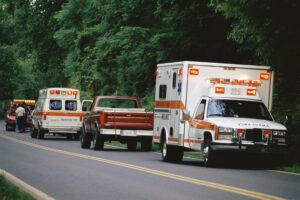A deadly ATV collision at Indian Mountain ATV Park in Cherokee County, Alabama, claimed the lives of two Georgia parents and left seven children hospitalized on Saturday, August 30. The crash occurred when two off-road vehicles collided on a remote trail in the Appalachian foothills.
Marcus Ragland, 34, of Rome, Georgia, was driving a side-by-side RZR carrying nine people when it struck another RZR with two occupants. After the impact, Ragland’s vehicle traveled approximately 150 feet, rolled over, and struck a tree. Ragland was ejected from the vehicle and pronounced dead at the scene.
His partner, Ashley Brooke Hawkins, 31, also of Rome, Georgia, was airlifted to UAB Hospital in Birmingham where she later died from her injuries. The two occupants in the second ATV were not injured in the collision.
Seven children ranging in age from one to 13 were injured in the crash. The injured children sustained varying degrees of trauma, from minor to life-threatening injuries. Ragland’s 13-year-old son suffered a skull fracture, while a 10-year-old daughter sustained a broken collarbone. A two-year-old was treated for spleen injuries, and Cherokee County Chief Deputy Josh Summerford indicated that four of the children have been released from the hospital.
Witnesses reported that Ragland was driving at a high rate of speed when he struck the other RZR, though the other driver attempted to avoid the crash. Authorities confirmed that neither Ragland, Hawkins, nor the seven children were wearing seatbelts or safety harnesses at the time of the collision.
The couple left behind 13 children in total. Ragland was the father of 10 children, while Hawkins was the mother of three, including two children they shared who were among those injured in the crash. Aubrey Dunn, the mother of two of Ragland’s children, told FOX 5 Atlanta that her one-year-old is limping with facial scratches, while her other son has a gash on his head but is recovering well.
Ragland’s mother, Felecia Towers, described her son as someone who visited the ATV park every weekend. She expressed her grief over the loss, stating he was a good person who was fun to be around.
First responders arrived at the crash site within 18 minutes of receiving the initial report. Cherokee County Emergency Management Director Shawn Rogers emphasized the importance of safety measures, advising riders to always wear restraint systems and never exceed the number of passengers a vehicle is designed for.
Indian Mountain ATV Park issued a public statement following the incident, expressing that they are “profoundly saddened” by the accident’s occurrence. The park management indicated they continue to cooperate fully with authorities investigating the incident and extended their deepest sympathies to the grieving families.
The park statement also acknowledged the efforts of first responders, law enforcement, and EMS personnel who provided aid during the emergency. Despite existing safety rules at the 4,700-acre facility, enforcement remains challenging due to the park’s expansive size and remote trail locations.
A GoFundMe campaign has been established to support the surviving children, receiving community support for the family during this difficult time. The fundraising effort aims to help provide for the children who lost their parents in the accident.
The Cherokee County Sheriff’s Office continues its investigation into the accident. Authorities are awaiting toxicology results to determine whether alcohol played a role in the crash, though no preliminary findings have been released regarding potential impairment.
Cherokee County Emergency Management Director Shawn Rogers noted that when multiple people and machines are involved on narrow trails, accidents can occur more frequently. The investigation remains ongoing as authorities work to determine all contributing factors to the deadly collision.
This incident highlights the inherent risks associated with ATV recreation, particularly when safety protocols are not followed. The accident serves as a reminder of the importance of proper safety equipment usage and adherence to vehicle capacity limits during off-road recreational activities.

